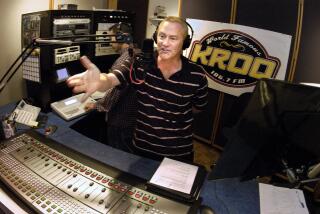The Chat Room
- Share via
It’s hard enough to tell what decade this is without radio stations taking giant steps into the past, but KLOS has invoked the ghost of KMET, L.A.’s seminal free-form FM rock station, by bringing back veteran deejay JIM LADD for his third stint in three decades. Hard-core Ladd fans speak in hushed tones of his long residency at KMET, which tuned out for good in 1987. After two years off the air, Ladd’s one-toke-over-the-line aura can be heard again nightly from 6 to 10, when he raps with loyal listeners and spins a Bic-flicking blend of rock classics. It’s like he never left.
*
Q: Your callers sound like they missed you bad. A: We’ve been through a lot together--a lot of life. Some of the greatest moments of my career come directly from picking up the request line.
Q: Example?
A: Somebody who’s listening to the show, is into the particular subject we’re talking about at the moment and suggests exactly the right song to come next that I hadn’t thought of. I love that.
Q: People talk about KMET like it was Camelot.
A: When KMET was alive and well, I can’t even tell you how different it was here. It was like the electronic campfire that two generations of rock ‘n’ rollers gathered around. When we worked there, we knew at that moment that we were the luckiest people in the world.
Q: How did that manifest itself?
A: During the paraquat scare in the Carter administration [when Congress funded spraying the pesticide on marijuana crops], a guy calls up and says, “Why don’t you give out the White House phone number? There’s a public line that’s open 24 hours a day.” I gave out the number at midnight. It’s 3 o’clock in the morning, D.C. time, and the switchboard just exploded. We effectively shut down the public phones at the White House for two hours. Then the station picked up the cause. In about a month, we gathered 75,000 signatures and put them on the desk of the Drug Enforcement Administration. And a month after that, Congress voted to repeal the funding of paraquat. This came from not a nationwide movement, but one radio station. And it started with one listener.
Q: People identify you with, shall we say, the old days. Is your show relevant to L.A. now?
A: We have to remember that what got us here was believing in the music and believing in the listeners. When John Lennon died, people did not turn on the news in this town--they went to KMET. People have missed having that connection.
More to Read
The biggest entertainment stories
Get our big stories about Hollywood, film, television, music, arts, culture and more right in your inbox as soon as they publish.
You may occasionally receive promotional content from the Los Angeles Times.









